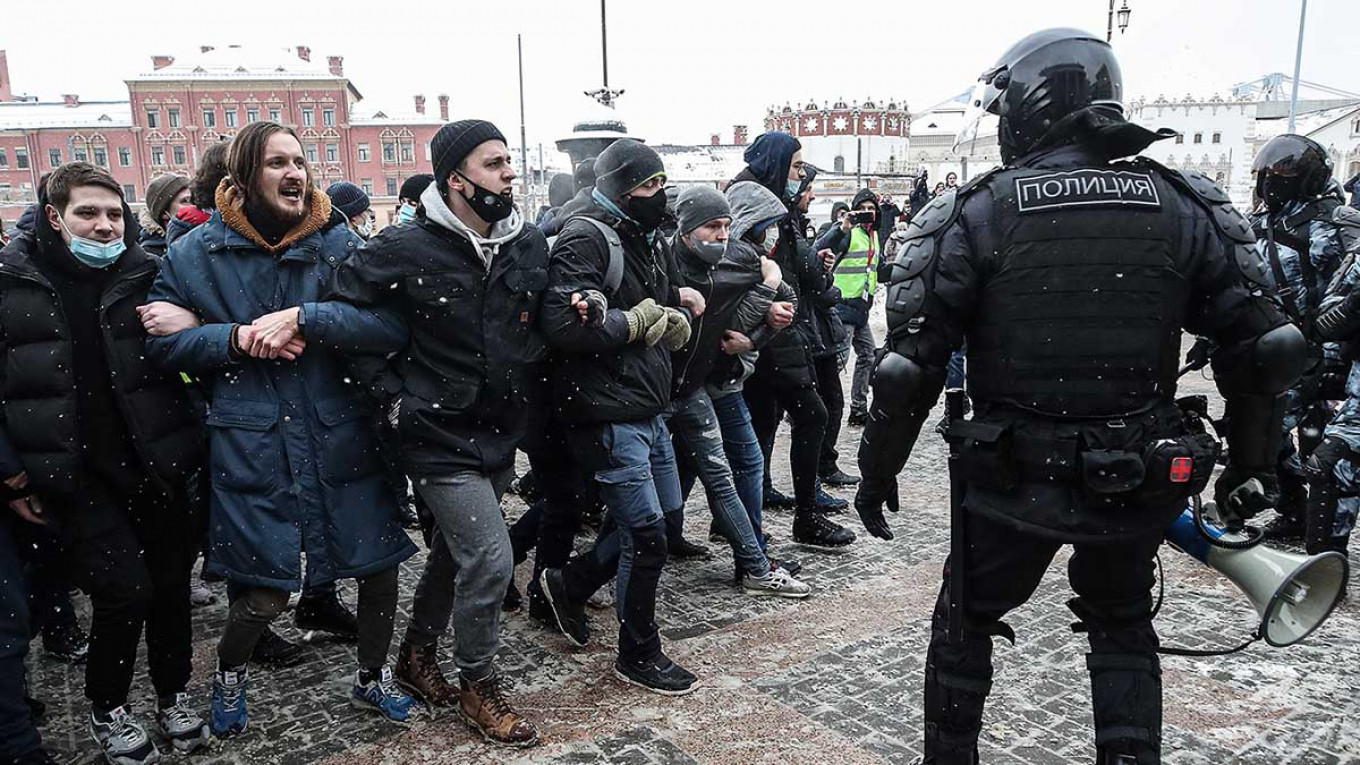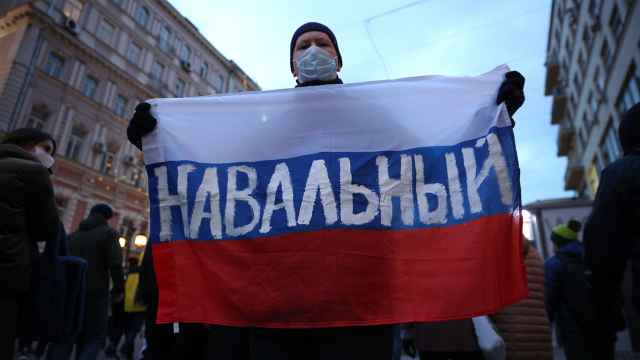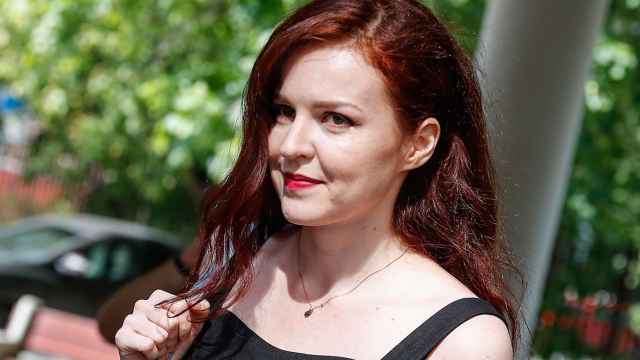The incredible sacrifices made by opposition leader Alexei Navalny, including on a personal level, have boosted his trust ratings across the country by an average of just one percentage point in January and February 2021, compared with November 2020. According to research from the independent Levada Center pollster, he is now in sixth place among politicians, two percentage points behind Foreign Minister Sergei Lavrov.
But through his extraordinary conduct, Navalny has drawn usually passive citizens out of their usual indifference — the level of disapproval with the government has grown by six percentage points to 56% from September.
This data may provoke another wave of debate about the flaws in sociological surveys. “How is this possible?” people will say. “Everyone around me has become a Navalny supporter, so the sociologists must be lying.”
But there’s more to the figures than meets the eye — the devil and the trends are in the details.
The sociological indicators are sobering. We need to understand that in Russia, where the same person has ruled for 20 years, the last few of which have been marked by the formation of a fully-fledged, non-hybrid authoritarian regime, stirring the average citizen is not so easy.
If we remove the eternal Putin from the approval and trust ratings we find a stark void — he is followed immediately in the trust rankings by Mishustin, Zhirinovsky, Shoigu and Lavrov.
These are not politicians. Even Zhirinovsky, who for 30 years has been a function in himself and a key cog in the Kremlin administration. He is an old cabaret artist who remains on stage only due to the complete lack of alternatives.
But Navalny is a politician. And in the opposition sphere he has the very same monopoly that Putin enjoys in the state sphere. In fact, the whole of current Russian politics is a collision of two verticals, the Putin vertical and the Navalny vertical.
As a result of Navalny’s decision to return to Russia and disturb the peace, the map of Russians' preferences — excluding the large numbers who “find it difficult to answer,” — has become black and white. Even if a respondent doesn’t like Navalny, but dislikes Putin’s system even more, they are ready to take to the streets for the brave and uncompromising opposition figure.
In addition, Navalny has become the embodiment of everything new. That sets him apart from the head of state, who, no matter how hard he tries to encourage the country’s tame "volunteer" youth, personifies all that is old, archaic and conservative. He looks vulgar and ridiculous, like the palace in Gelendzhik, an offering to the commander-in-chief from his "friends."
It is often posited that any politician in a democratic Western country would dream of having electoral, trust and approval ratings like Putin. Yet these are incomparable quantities. It is impossible to compare the ratings of an autocrat in an authoritarian regime with a normal competitive electoral process, complemented by a regular rotation of power and real self-government.
Even if democracy were to arrive in Russia tomorrow, inertia would lead the conformist to seek out valuable indicators of which party was the party of power and which of the politicians was the real boss. It is easy to lose the reflexes of a normal voter over the course of a couple of decades.
The psychology of the conformist
For the conformist, Navalny is a disturber of the peace. Not in the political sense, but in the spiritual one. “What is the point of all these investigations,” asks the conformist. They just upset things, and the fact that everyone at the top is corrupt is hardly news. So why go through something you don’t want to think about yet again?
It’s the same with the poisoning. Yes, deep in their hearts ordinary Russians perhaps know that the attempted assassination of Navalny is far from a “Western set-up.” But they block out undesirable information, a defense mechanism kicks in. Murder is bad and supporting a state that encourages murder is not good. But ordinary Russians want to keep supporting the state since it keeps food on their plates.
And in these situations, the conformist simply becomes an aggressive conformist, singing Putin’s praises in flashmobs organized by the management of an enterprise.
The cliché holds true. The working people — as opposed to the hipsters — back the current authorities. Creativity has come a long way. While before there were pro-Putin rallies and concerts, now there are flashmobs.
Navalny has the support of the young, a group which just several years ago was far more conformist in character. His approval rating is high, at 36%, in the 18–24 age group, and comparatively high, at 23%, among those aged 25–39. In the very youngest group the approval level for the opposition leader is 43%, and 14% found it difficult to answer.
Modernized thinking and models of contemporary behavior are inexorably leading toward the eclipse of outdated traditionalism, which sometimes veers into fundamentalism as a defensive reaction against all that is new and incomprehensible. But this is not a rapid process.
And it is progressing at an even slower pace in an authoritarian environment where there is a monopoly, still effective, on a predominant narrative about a world where somebody who goes to a protest is seen as being in the pay of the U.S. State Department and having “sold out to the Yankees.” A world where the most stable salaries and clear career trajectories are in the army, the police, the special services, the courts, the state corporations close to the throne and the civil service.
This is a world where being sent to the army is a punishment for dissenting youths, and expulsion from university is a pre-emptive gift from the rector to the fatherly authorities. A world where the elites have been nationalized and feel like hostages. Those who are under personal sanctions will go with Putin to the end, since the road to the West and the “wonderful Russia of the future” is forbidden to them.
Navalny the trigger
There would never have been such massive, even nationwide, demonstrations without Navalny's return. The reasons for protest are accumulating, and there is colossal anger. For some it is economical. For those who have come out onto the streets the last three times, it is political, and even existential, the modernized youth against an archaic state. But for the crucial step to be taken across the threshold, a trigger is needed.
This trigger was missing in the summer, when Putin reset his presidential terms. Then everybody was asking themselves why nobody was going out onto the streets.
What happened in late January and early February 2021 was actually the postponed protest of summer 2020. This is dissatisfaction with the high-handedness of a regime which has subverted the constitution in its own interests and decided to live forever. The trigger for open discontent was offered — at a high cost to himself — by Alexei Navalny.
What has happened is not so much a broadening of the ranks of Navalny supporters as much as the politicization of civil society and growth in the numbers of those in favor of the renewal and modernization of Russia on conditions that are not dictated by Putin and his bronzed circle.
Navalny has secured for himself the status of a political fighter for power, but, having become a sacrificial lamb and a symbol of a civic movement against the regime, has also acquired moral weight.
This is important in the sense that civil society, to which he perhaps has been building a bridge, as yet unfinished, is now to a great degree on his side. He now has the chance to become not only a political, but also a civic leader.
This is far more perilous for the Kremlin. Through the Kremlin battlements and the dark visor of a riot policeman’s helmet the authorities see the individual on the city square as a supporter of the opposition, yet the person on the square is a citizen.
Once beaten by a baton or kicked by a boot, a citizen becomes a member of the opposition. Аnd they begin to consider a government that relies on batons and defending itself with several rows of shields as an occupier.
Navalny has forced everyone to defend themselves, and also to explain themselves.
This article was first published by our partner outlet VTimes.
A Message from The Moscow Times:
Dear readers,
We are facing unprecedented challenges. Russia's Prosecutor General's Office has designated The Moscow Times as an "undesirable" organization, criminalizing our work and putting our staff at risk of prosecution. This follows our earlier unjust labeling as a "foreign agent."
These actions are direct attempts to silence independent journalism in Russia. The authorities claim our work "discredits the decisions of the Russian leadership." We see things differently: we strive to provide accurate, unbiased reporting on Russia.
We, the journalists of The Moscow Times, refuse to be silenced. But to continue our work, we need your help.
Your support, no matter how small, makes a world of difference. If you can, please support us monthly starting from just $2. It's quick to set up, and every contribution makes a significant impact.
By supporting The Moscow Times, you're defending open, independent journalism in the face of repression. Thank you for standing with us.
Remind me later.








